February 27, 2012
Edited by David Sanders
Specimen Days
February 27, 2012
1784 – Elias Annes Borger, Dutch theologist/poet (To the Rhine), is born.
1807 – Henry Wadsworth Longfellow, Portland Maine, poet (Hiawatha), is born.
1881 – Sveinn Bjornsson, 1st president of Iceland (1944-52)/poet (Figur ild), is born.
1943 – Kostis Palamas, Greek poet, twice nominated for the Nobel prize (b. 1859), dies.
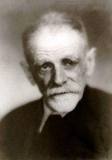 What storm, I wonder, was raging in me?
What storm, I wonder, was raging in me?
And what whirlwind
that couldn’t put it to rest, or lull it to sleep.
My wonderful dream of my home by the sea.
A grief that is unspoken, an unexplained grief.
A powerful grief.
A grief not quenched even within the paradise
of our early life close to the boundless sea.
—from “Grief” (Kostis Palama, 1859–1943)
Poetry In The News
From the Military to Poetry
Adams made little fuss when his first book of poetry, “Adam’s Ribs” , came out in 2008. Now it’s available online and at the San Gregorio Store, La Honda Country Store and in Mountain View and San Francisco bookstores. Its freeform verses capture life, consciousness, relationships and insight. Evocative and accessible, they invite discovery. Read more at Half Moon Bay Review.
Poetry in Motion at Dover High: “Never have I ever heard so many students quiet”
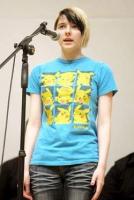 Tuesday afternoon found something strange at Dover High School — an auditorium full of teenagers being quiet. What made it more curious is what they were being quiet for — poetry. Specifically Poetry Out Loud! A Competition of Verse, a program that encourages the nation’s youth to learn about great poetry through exploration, memorization and performance. Part of a countrywide program created by the National Endowment for the Arts and the Poetry Foundation, it starts as a grassroots contest and culminates in a national championship in Washington, D.C., with some $50,000 in prizes waiting. Read more at Foster’s Daily Democrat.
Tuesday afternoon found something strange at Dover High School — an auditorium full of teenagers being quiet. What made it more curious is what they were being quiet for — poetry. Specifically Poetry Out Loud! A Competition of Verse, a program that encourages the nation’s youth to learn about great poetry through exploration, memorization and performance. Part of a countrywide program created by the National Endowment for the Arts and the Poetry Foundation, it starts as a grassroots contest and culminates in a national championship in Washington, D.C., with some $50,000 in prizes waiting. Read more at Foster’s Daily Democrat.
Louder Than a Bomb 2012: The 12th Annual Chicago Youth Poetry Festival
The largest of its kind in the world, Louder Than A Bomb (LTAB) is Chicago’s rapidly-growing teen poetry festival, this year taking place at various venues around Chicago beginning February 18 and continuing through to the finals on March 10, 2012. Aiming to bring teens together across racial, gang, and socio-economic lines, LTAB is a friendly competition that emphasizes self-expression and community via poetry, oral story-telling, and hip-hop spoken word. Read more at WBEZ.
World Poetry
Chinese Poetry in Tamil
Acclaimed Pashto poet and writer Murad Shinwari died of multiple medical problems in his home in Khyber Agency on Saturday. He was 85. He was laid to rest in his hometown Landi Kotal. Poets, writers and tribal elders turned up at his funeral in a large number to pay commemoration to the great writer and pray for his eternal peace.Brought up by his father Amir Hamza Khan Shinwari, known as Baba-i-Pashto Ghazal, he was considered pioneer of modern Pashto poem. According to a group of researchers, the first blank verse in Pashto was written by Murad Shinwari. Read more at Dawn.
New Books
4:56: Poems by Carlos Fuentes Lemus
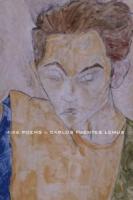 [Paperback] Dalkey Archive Press, 112 pp., $12.95
[Paperback] Dalkey Archive Press, 112 pp., $12.95
Difficult though it often is to recognize the value of a young author’s work when he is working in the shadow of an internationally recognized parent, it would be more difficult still not to appreciate the talent behind these posthumous poems by Carlos Fuentes Lemus, son of the author of Terra Nostra and Distant Relations. The intimate texts that compose this book give us a glimpse of a major poet who understood early on that “adolescence” is a dangerous word. Chronicling his brief life, 4:56 introduces us to a writer capable of celebrating the world even while aware of his imminent departure from it.
A Hotel Lobby at the Edge of the World: Poems by Adam Clay
[Paperback] Milkweed Editions, 96 pp., $16.00
The distilled, haunting, and subtly complex poems in Adam Clay’s A Hotel Lobby at the Edge of the World often arrive at that moment when solitude slips into separation, when a person suddenly realizes he can barely see the place he set out from however long ago. He now sees he must find his connection back to the present, socially entangled world in which he lives. For Clay, reverie can be a siren’s song, luring him to that space in which prisoners will begin “to interrogate themselves.”
Useless Landscape, or A Guide for Boys: Poems by D. A. Powell
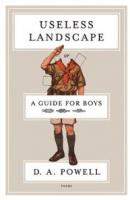 [Hardcover] Graywolf Press, 80 pp., $22.00
[Hardcover] Graywolf Press, 80 pp., $22.00
In D. A. Powell’s fifth book of poetry, the rollicking line he has made his signature becomes the taut, more discursive means to describing beauty, singing a dirge, directing an ironic smile, or questioning who in any given setting is the instructor and who is the pupil. This is a book that explores the darker side of divisions and developments, which shows how the interstitial spaces of boonies, backstage, bathhouse, or bar are locations of desire. With Powell’s witty banter, emotional resolve, and powerful lyricism, this collection demonstrates his exhilarating range.
Guide to Capturing a Plum Blossom by Sung Po-jen,translated by Red Pine
[Paperback] Copper Canyon Press, 216 pp., $16.00
Through a series of brief four-lined poems and illustrations, Sung Po-jen aims at training artistic perception: how to truly see a plum blossom. First published in AD 1238, Guide to Capturing a Plum Blossom is considered the world’s earliest-known printed art books. This bilingual edition contains the one hundred woodblock prints from the 1238 edition, calligraphic Chinese poems, and Red Pine’s graceful translations and illuminating commentaries.
Recent Reviews
Poetry Review: Lauren Berry, Brian Barker and Charles Wright
by Alex Lemon
The life cycle of contemporary poetry is on display in three collections that all belong on poetry lovers’ bookshelves. Lauren Berry’s The Lifting Dress was one of five winners of the 2010 National Poetry Series, as selected by Terrance Hayes, who is arguably the best poet writing today. Hers is an incisive debut collection that deserves Hayes’ high praise. Read more at the Dallas News.
A True Note on a Dead Slack String (Thomas Kinsella)
 by Harry Clifton
by Harry Clifton
Great poems of old age, as we know, are often written in middle age, when the energy for a full-blown statement is still there, not to mention a belief in technique and its sophistications, something that can dwindle in later years. Poems such as Yeats’s “The Tower,” Larkin’s “The Old Fools” or Hughes’s “October Salmon” were written by men in their 40s and 50s, projecting themselves forward into states and moods yet to be lived through. More typically, though, as in late Kavanagh, Auden, Lowell or MacNeice, we find a flattening out of the poetic line, a casualness that can be construed either way, as new refinement or disintegration of the psyche. Read more at the Irish Times.
Space, in Chains
by Ellen Davis
One of Mark Rothko’s floating rectangles is a fitting cover image for Laura Kasischke’s new book of poems, Space, in Chains. Just as his shapes are defined by formal qualities—line and color—so her poems are formally defined by syntax, line, and internal rhyme. Kasischke is interested in family, in death, in myth, in riddles, in stories, in gods, and in God. She has published eight books of poems and eight novels, one of which was turned into a movie with Uma Thurman, no less. Kasischke’s range and depth are apparent in everything she writes. She mixes abstract and narrative approaches to her poetry and her work is highly postmodern and fragmentary. Read more at the Harvard Review.
The Poems of Antonia Pozzi
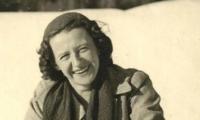 by Thea Lenarduzzi
by Thea Lenarduzzi
On December 2, 1938, Antonia Pozzi lay down in a field on the outskirts of Milan and swallowed poison. She died the following day, leaving behind diaries, notebooks and loose pages of poetry, documenting her twenty-six years of life. From these, her father Roberto Pozzi, a Milanese lawyer, selected and edited her first collection, publishing it as Parole the following year. References and dedications to her lover and classics tutor, Antonio Maria Cervi, were eliminated, titles were changed, lines were cut. It was reissued in 1948, still pockmarked by paternal censorship, but with a preface by Eugenio Montale. Subsequent volumes have restored much emotional and erotic honesty to the poems. Editions by Alessandra Cenni, Onorina Dino and other female scholars from the mid-1980s onwards have tempered what Peter Robinson describes in the introduction to his new translation of Pozzi’s poems as the “saccharine”, while a collection by Lawrence Venuti, Breath: Poems and letters (2002), modulated her northern European pitch to chime with American women modernists such as H. D. and Amy Lowell. Read more at TLS.
Correspondences
Avant-garde Shamaness Takes a Poetic Journey to the Californian Suburbs
by David Hoenigman
In a YouTube clip from February 2011, Hiromi Ito begins a reading of an excerpt from her narrative poem “I Am Anjuhimeko (Watashi wa Anjuhimeko de aru)” at the Museum of Modern Aomori Literature by banging the palm of her hand loudly and repeatedly on the desk in front of her. She sits down, squares her shoulders and launches into a recital that at first borders on frantic but soon escalates to a point that would be hard to describe otherwise. Her voice portrays urgency, confusion, panic and a desperation to convey a complexity of ideas at a rate that’s nothing short of alarming. Read more at the Japan Times.
Major Jackson Talks with Denise Duhamel about her Poems, “If You Really Want To” and “Tina and the Bruised Hearts”
MJ: I think one of the qualities that I enjoy about your writing, particularly in this poem, is its immediacy. You’re able to capture the texture of the real world yet somehow transform it. What do you do to move the material beyond the mundane and into that place of artifice and art? Read more at the Harvard Review.
Interview with Poet Jerry Williams “Gamblin’ Man”
by Adam Fitzgerald
Recently, I sat down to begin an e-mail exchange with Jerry Williams. His latest works include a collection of poetry entitled Admission (Carnegie Mellon, 2010) as well as the highly successful anthology It’s Not You, It’s Me: The Poetry of Breakup (Overlook Press, 2009), newly available in paperback. Just as Williams wears many hats beside that of poet—anthologist, essayist, and director of Marymount Manhattan College’s burgeoning Creative Writing program—so too are readers invited to discover the contemporary American lyric in all of its oddball, personal, and inevitably political resonances. One thing’s for sure, Williams’s humor and erudition distinguish his happily cantankerous voice, as seen in the following interview and throughout his poems which quietly, though stubbornly, defy categorization. Read more at the Brooklyn Rail.
Broadsides
“Bright and sharp and telling”: Robert Lowell and the Art of the Pen Portrait
by Thomas Travisano
Lowell’s very first letter to Bishop begins with a series of kind but somewhat conventional remarks of sympathy and praise for Bishop. Then the letter abruptly leaps into an odd, and very funny anecdote, which seems readers of The Letters of Robert Lowell (2005) might think quite inconsistent with Lowell’s letter writing style to date. It seems as though Lowell had intuited the precise mode of address most likely to please this extremely desirable correspondent, just as Bishop had intuitively guessed that an invitation to the circus was the precise opening gambit with which to woo her eventual mentor Marianne Moore. In any case, after those two brief, polite paragraphs, Lowell launches into this perfectly shaped pen portrait. Read more at Berfrois.
Making Sense of Wallace Stevens (With Help From Some Experts)
by Jeff Gordinier
As I explore in this weekend’s Travel section, the Pulitzer Prize-winning poet Wallace Stevens made a comfortable living as an insurance executive in Hartford. Many of his poems surfaced in his mind as he ambled along the sidewalks of Connecticut’s capital on the way to his office. When Harold Bloom, the Yale professor and 81-year-old lion of American literary scholarship, was a 17-year-old freshman at Cornell University, he took a trip to Connecticut to experience an encounter with Stevens. Read more at the New York Times.
Drafts & Fragments
Robert Pinsky Blends Poetry And Jazz In Latest Project
 LISTEN NOW
LISTEN NOW
PoemJazz is a collaboration between poet Robert Pinsky and Grammy award-winning pianist Laurence Hobgood. They will be performing Friday, February 24 at the Regatta Bar.Robert Pinsky is a Boston University professor, and of course, the former three term United States poet laureate. Hobgood is a composer, arranger, and pianist who has worked with jazz singer Kurt Elling for more than 17 years.
Envoi: Editor’s Notes
Hugh Kenner on the Pisan Cantos
Watch here. From 3 Quarks Daily.
Whatever one’s feelings about Ezra Pound, especially his role in the Second World War, there is something unsettling about the thought of this man being kept in an outdoor cage until he had a breakdown and was allowed a pup tent and a typewriter. It was there he composed his peculiar, chiselled poetry, a poetry that mimics the mind holding on to anything it can, including, as Kenner notes, memory. Here is one of the best-known lines from these efforts:
“What thou lovest well remains,
the rest is dross”
Whether the rantings of a madman or wisdom in the face of history, it strikes me as particularly moving and hard won. Incidentally, the section of the newsletter directly preceding this one, Drafts & Fragments, takes its title from the last section of the Cantos, so I might be showing my hand.
—David Sanders